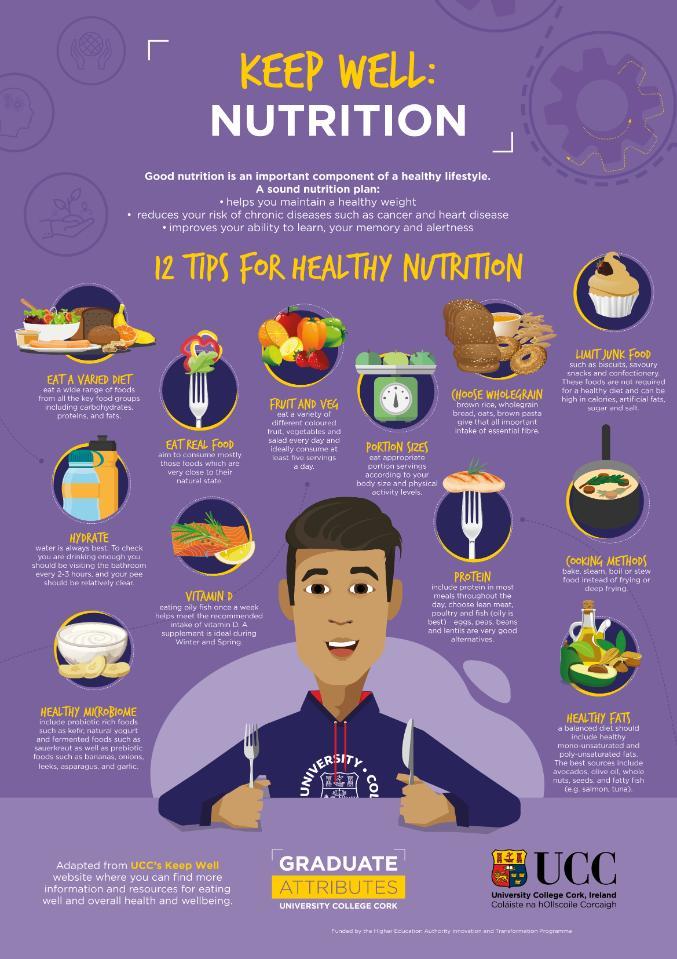
Good nutrition is an important component of a healthy lifestyle. When combined with regular physical activity and good restorative sleep, a sound nutrition plan can give multiple benefits including maintaining a healthy weight, and reducing your risk of chronic diseases such as cancer and heart disease, and crucially for a student, research has shown an improved ability to learn, better memory and alertness.
12 Tips for Healthy Nutrition

- Variety - no one single food can give your body all the nutrition it requires so eat a wide range of foods from all the key food groups including carbohydrates, proteins, and fats.
- Eat real food - aim to consume mostly those foods which are very close to their natural state eg. fresh vegetables, nuts, eggs, lentils, fish, beans, wholegrain rice, etc
- Fruit and veg - eat a variety of different coloured fruit, vegetables and salad every day, ideally in-season and can be fresh or frozen. Base all meals on this group and ideally consume at least five servings a day.
- Choose wholegrain - brown rice, wholegrain bread, oats, brown pasta give that all important intake of essential fibre.
- Protein - include protein in most meals throughout the day, choose lean meat, poultry and fish (oily is best) but remember that eggs, peas, beans and lentils are very good alternatives.
- Healthy fats - a balanced diet should include healthy monounsaturated and polyunsaturated fats. The best sources include avocados, olive oil, whole nuts, seeds, and fatty fish such as salmon and tuna.
- Hydrate - water is always best. To check you are drinking enough you should be visiting the bathroom every 2-3 hours, and your pee should be relatively clear
- Cooking methods - bake, steam, boil or stew food instead of frying or deep frying. Go for a light gold colour when cooking, not brown.
- Limit junk food - such as biscuits, savoury snacks and confectionery. These foods are not required for a healthy diet and in general tend to be high in calories, artificial fats, sugar and salt.
- Healthy microbiome - include probiotic rich foods such as kefir, natural yogurt and fermented foods such as sauerkraut as well as prebiotic foods such as bananas, onions, leeks, asparagus, and garlic.
- Vitamin D - eat oily fish once a week helps meet the recommended intake of vitamin D. A supplement is ideal during Winter and Spring which provides at least 5-10 μg of vitamin D per day.
- Portion sizes - eat appropriate portion servings according to your body size and physical activity levels. If you are less active then reduce starchy carbohydrates and replace with leafy vegetables/salad.
Resources for Eating Well
- Practical advice on nutrition during lockdown from the Irish Nutrition and Dietetic Institute
- The Food Safety Authority of Ireland (FSAI) comprehensive healthy eating guidelines (updated in 2019)
- Cork Sports have lots of great ideas for meals to prepare
- Irish Government Healthy Eating During COVID-19
Keep Well
Bí Sláintúil
Contact us
East Wing, Main Quadrangle, UCC,
